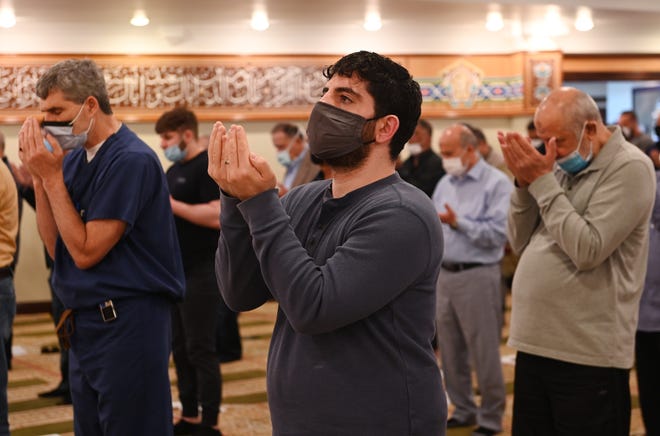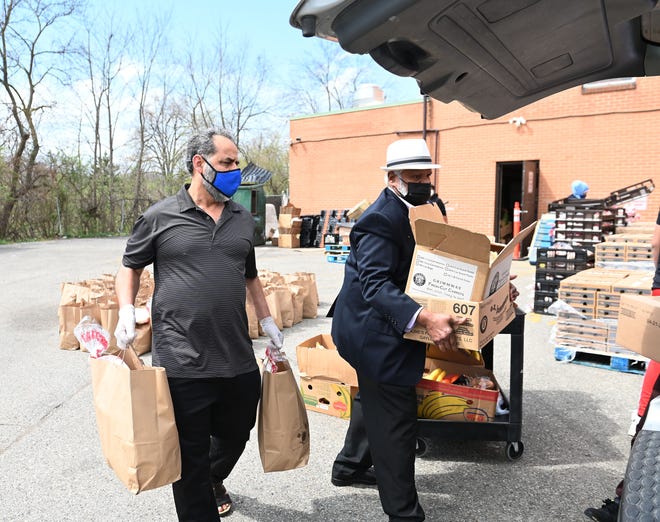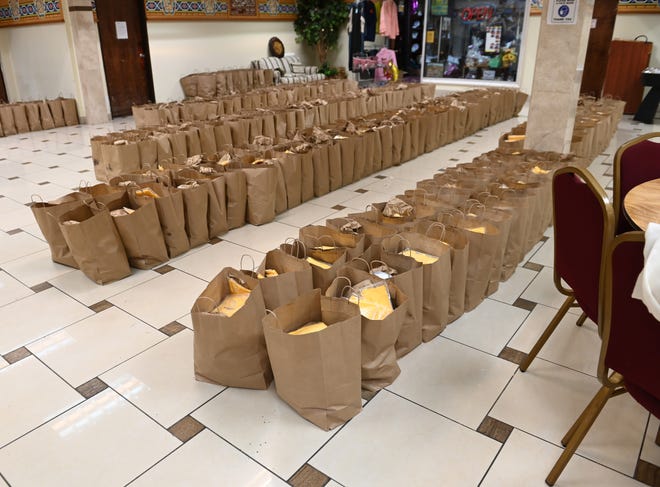The following is an excerpt from an article posted in The DetroitNews.com | April 11, 2021
“This week, as Ramadan again unfolds during the pandemic, the faithful in southeast Michigan are working to protect themselves amid soaring virus cases while finding ways to embrace the essential elements of the holy month: pursuing charitable acts, connecting with the community and seeking spiritual heights.
That means balancing socially distanced services and smaller dinners after long days of fasting with a renewed emphasis on donating goods to struggling residents, even during drive-thru events.
“We expect that there will be with precautions with all measures taken to prevent spread,” said Dr. Mahmoud Al-Hadidi, board chairman for the Michigan Muslim Community Council. “We sent a word of caution to our community: even though they want to celebrate, not to let their guard down. We have to focus on saving lives at the same time we are trying to survive.”

To prep for the holy month, which many in Metro Detroit start celebrating Tuesday while others begin observing Monday, the National Muslim Task Force on COVID-19 and the National Black Muslim COVID Coalition on Ramadan 2021 issued guidelines to help religious officials.
The recommendations include plans that include spacing worshipers 6 feet apart, requiring wearing masks, limiting mass gathering and having visitors bring their own prayer rugs.
Some mosques, like Muslim Unity Center in Bloomfield Hills, are enforcing capacity limits during prayer times.
Mosques also are enhancing their plans to tackle charitable giving from safe distances.
“The vast majority of mosques have learned lessons in comparison to last year and learned that there’s a heightened capacity to be able to give,” said Dawud Walid, executive director at the Council on American-Islamic Relations’ Michigan chapter.
At the Islamic House of Wisdom in Dearborn Heights, which has offered vaccinations and has socially distanced in-person prayer services, a regular food distribution was expanded to match the growing needs in the surrounding areas, said its leader, Imam Mohammad Ali Elahi.

Lengthy lines of cars have queued up as volunteers haul out boxes bearing fruit and other items. Such efforts take on greater meaning during Ramadan, which aims to “make us a better human being and better related to our creator,” Elahi said. “The mosque is not just a place of prayer but to provide and help during this crisis.”
The Islamic Center of Detroit recently won a $12,500 grant from Islamic Relief USA, a nonprofit humanitarian and advocacy group, to provide food, hygiene kits and other aid to residents facing hardships during the holy month.
“The month of Ramadan is an opportunity for Muslims across the world to increase giving and empathy. It is a time to remember our neighbors who are struggling and have found themselves in vulnerable circumstances,” said Sharif Aly, chief executive officer at Islamic Relief USA.
The windfall helps the mosque, which has received a separate grant to help feed seniors and soon plans to partner with the city to host vaccinations, to serve as many as 500 families seeking food each week, said its executive director, Sufian Nabhan. “If faith-based organizations can’t be there when they need it the most, they can’t justify their existence.”
The effort attracted volunteers such as Malek Sarhan, who soon after relocating from Chicago last summer noticed cars lining up one day after prayers. He decided to return each week to help load fresh milk, eggs, fruit and bread as well as other staples and expects to do so throughout Ramadan. “Knowing you’ll be able to help them, that’s the definition of spiritual fulfillment in my opinion,” the 23-year-old said. “This is really the time to go out of your way to make sure you’re giving back.”
Wayne County-based humanitarian organization Zaman International is distributing hundreds of free “charity kits” during a drive-thru Saturday at its Hope for Humanity Center.
The kits push families to pursue charitable giving through activities such as creating a food box and hygiene packages or sponsoring local families; buying a holiday gift for a child in need; donating spare change to support Zaman’s mission.

The initiative coincides with the group, which also plans multiple food distributions during Ramadan, seeing a spike in needs due to the pandemic. Last year, Zaman distributed 376,000 pounds of food, or an increase of 99 tons over 2019 totals, chief impact officer Monica Boomer said.
“The holy month is a time of focus and it’s a time of turning inward, and my hope is that by providing this opportunity for the community to serve that we are providing them an opportunity to turn inward and to reflect and to really feel the need and push it out into the community and do something proactive with it,” said CEO Najah Bazzy.
Ramadan typically has a communal feel reflected in a central tradition: iftars, or meals to break the fasts from food and water that worshipers undertake between sunrise and sunset.
While coronavirus restrictions have largely canceled lavish iftars, businesses are prepping to welcome a steady stream of customers.
New Yasmeen Bakery in Dearborn plans to remain open 24 hours daily and field online orders for popular items served only during Ramadan, co-owner and manager Hussein Siblini said.
That means a flood of requests to fill bags with mushtah bread for predawn meals; jallab, a drink made from carob, dates, grape molasses and rose water; and salep, a cinnamon-topped, milk-based hot beverage. Customers also turn to must-have items such as dates, fattoush salad and lentil soup.
“People order all kinds of things because I think they crave anything that they don’t eat during the day” of fasting, Siblini said.
The University Islamic Center of Detroit is working to fill that need by offering “distanced dinners” during Ramadan.
Instead of guests seated together with heaping plates of warm entrees after nightly prayers, they receive boxed meals to enjoy spaced out or away from the property, said Azhar Rehmani Saiyed, a volunteer helping coordinate the effort. “It brings the people together.”
Read the post on The DetroitNews.com